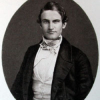Francis Parkman

Francis Parkman
Francis Parkman, Jr.was an American historian, best known as author of The Oregon Trail: Sketches of Prairie and Rocky-Mountain Life and his monumental seven-volume France and England in North America. These works are still valued as historical sources and as literature. He was also a leading horticulturist, briefly a professor of Horticulture at Harvard University and author of several books on the topic. Parkman was a trustee of the Boston Athenæum from 1858 until his death in 1893...
NationalityAmerican
ProfessionHistorian
Date of Birth16 September 1823
CountryUnited States of America
Few passages of history are more striking than those which record the efforts of the earlier French Jesuits to convert the Indians.
The raft was at length complete. We piled our goods upon it, with the exception of our guns, which each man chose to retain in his own keeping.
Spanish civilization crushed the Indian. English civilization scorned and neglected him. French civilization embraced and cherished him.
France built its best colony on a principle of exclusion, and failed; England reversed the system, and succeeded.
America was still a land of wonder. The ancient spell still hung unbroken over the wild, vast world of mystery beyond the sea,-a land of romance, adventure, and gold.
Early on the next morning we reached Kansas, about five hundred miles from the mouth of the Missouri.
Many of the Iroquois and Huron houses were of similar construction, the partitions being at the sides only, leaving a wide passage down the middle of the house.
The monk, the inquisitor, and the Jesuit were lords of Spain,- sovereigns of her sovereign, for they had formed the dark and narrow mind of that tyrannical recluse. They had formed the minds of her people, quenched in blood every spark of rising heresy, and given over a noble nation to a bigotry blind and inexorable as the doom of fate. Linked with pride, ambition, avarice, every passion of a rich, strong nature, potent for good and ill, it made the Spaniard of that day a scourge as dire as ever fell on man.
In the middle of the sixteenth century, Spain was the incubus of Europe. Gloomy and portentous, she chilled the world with her baneful shadow.
The growth of New England was a result of the aggregate efforts of a busy multitude, each in his narrow circle toiling for himself, to gather competence or wealth. The expansion of New France was the achievement of a gigantic ambition striving to grasp a continent. It was a vain attempt.
If any pale student, glued to his desk, here seek an apology for a way of life whose natural fruits is that pallid and emasculate scholarship of which New England has had too many examples, it will be far better that this sketch had not been written. For the student there is, in its season, no better place than the saddle, and no better companion than the rifle or the oar.
America, when it became known to Europeans, was, as it had long been, a scene of wide-spread revolution.
We were now, as I before mentioned, upon this St. Joseph's trail. It was evident, by the traces, that large parties were a few days in advance of us; and as we too supposed them to be Mormons, we had some apprehension of interruption.
We were now arrived at the close of our solitary journeyings along the St. Joseph's trail.